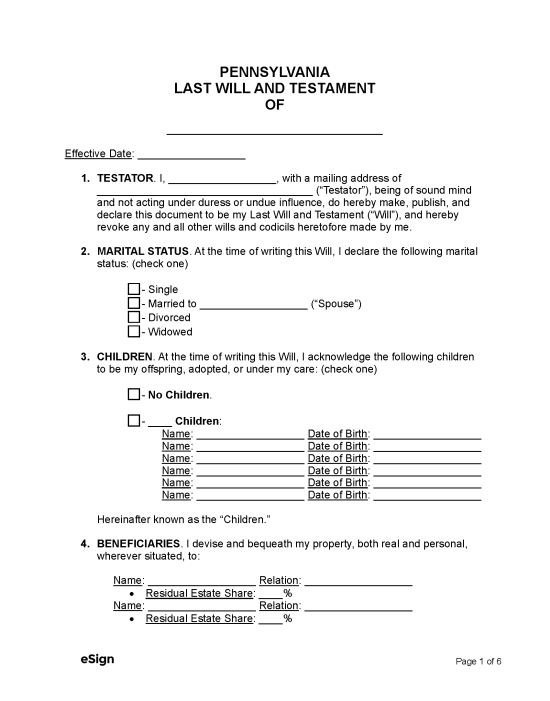

A Pennsylvania last will and testament is a document that communicates instructions for distributing and managing an individual’s estate after death. With a will, the individual (testator) can decide which relatives, friends, or other beneficiaries will inherit their real estate and personal property. They can also appoint guardians for children, determine how debts should be paid, and designate an executor (a.k.a., personal representative) to settle their affairs and distribute assets.
Any person who is sound of mind and at least 18 years old can make a will. [1]
Holographic Wills – Handwritten wills are considered valid in Pennsylvania only if they meet the same signing requirements as typed wills.
Revocation – A will can only be revoked by destroying the original, creating a new will, or drafting a statement that explicitly nullifies the document. [2] In the event of a divorce, any parts of the will regarding the former spouse lose their effect. [3]
Signing Requirements – A will must include the testator’s signature. If the testator cannot physically sign or can only write their mark, two witnesses must also sign the will while in the testator’s presence. [4]
A person who passes away with a legally valid will is considered to have died testate, and their estate is subject to the probate process. Part of this legal procedure involves the appointment of an executor to manage the estate’s assets and distribute them to beneficiaries.
The following is meant to be a general overview of the probate process. It is recommended that executors/personal representatives consult with an attorney if they’re unsure of any step.
Pennsylvania offers a simplified probate process that can be applied for with a Small Estate Affidavit, or “Petition for Settlement of a Small Estate,” but only if the estate is valued at $50,000 or less (not counting real estate and certain personal property). [5] [6]
The probate process will be initiated by the executor appointed in the decedent’s will. To begin, the executor must prepare a filing package that consists of the following:
The executor’s filing package must be submitted to the register of wills in the county where the decedent lived before their death. [7] Upon approval of the filing package, the executor will receive a document called Letters Testamentary, which validates their appointment to manage the decedent’s estate. Additionally, the executor will be given the following:
Probate Bond
The register of wills might require the executor to post a probate bond before allowing them to manage the estate. [8] If a bond is filed with the register of wills, it will only be returned to the executor once they successfully complete their estate administration duties.
Directly after receiving Letters Testamentary, the executor must advertise the probate proceeding to the decedent’s creditors. This is done by publishing a notice once a week for three straight weeks in a newspaper distributed in the area where the decedent lived and in a legal periodical approved by the court. [9]
Creditors must present their claims within one year of the advertisement’s publication . [10]
Using the Inventory provided by the register of wills, the executor must list and appraise all the decedent’s real estate and personal property. [11] The completed Inventory and two photocopies must be filed no later than the date the executor submits their Final Accounting or within nine months after the decedent’s death, whichever comes first.
A probate notice must be given to those with a beneficial interest in the estate, such as the decedent’s heirs and beneficiaries. [12] To accomplish this, the executor must do the following:
One of the executor’s administrative duties is to file and pay the applicable federal and state tax returns listed below.
Any debts owed to the decedent’s creditors will need to be paid before the estate can be settled. If the decedent didn’t leave enough assets to cover each debt, the executor must prioritize their payments in the following order: [14]
After all debts and taxes have been paid, the executor can prepare an Accounting of the estate assets and expenses (see sample). Once completed, the Accounting must be approved by either the beneficiaries or the register of wills.
Once the Accounting is approved by the beneficiaries or the register of wills, the executor can proceed with distributing the remaining assets . After distribution, the estate settlement can be finalized by submitting the Status Report, which was provided when initiating the probate process. If applicable, the Receipt and Release forms should be filed as well.
Note: A Status Report must be filed no later than two years after the decedent’s death and each year afterward until the estate is settled. [16]